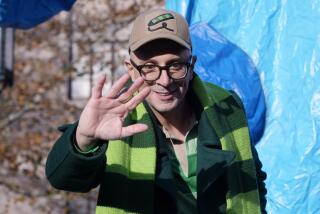Burns Returns to Tell His Story
- Share via
Several years ago Ken Burns asked PBS to put an embargo on re-airing his award-winning 1990 documentary, “The Civil War.”
“It seemed to me for the first seven or eight years after the original broadcast, it was ubiquitous on the system,” Burns says during a recent visit to Los Angeles. “It was like the British Empire. There wasn’t a moment where the ‘Civil War’ wasn’t some place playing during pledge. The system agreed it was good to build up some demand.”
Burns was hoping to do a big 10th anniversary airing of the five-part, 11-hour documentary that gripped the nation when it first aired, but he was too caught up in his latest historical documentary, “Jazz.”
“So we said we couldn’t juggle more than one documentary. So we settled on an even dozen years.”
Beginning Sunday, PBS will rebroadcast “The Civil War,” which has been completely digitally remastered. Simultaneously this week, Warner Home Video released the Emmy Award-winning series on DVD ($130).
Then on Sept. 30, PBS will premiere “Ken Burns American Stories,” a weekly series that will encompass his entire documentary career.
Among the films included on the series are: “The Statue of Liberty” (Sept. 30), the Oscar-nominated “Brooklyn Bridge” (Oct. 21); “Thomas Jefferson” (Oct. 28, Nov. 4); “Mark Twain” (Nov. 18 to 25). “Empire of the Air: The Men Who Made Radio” (Dec. 9) and “Huey Long” (Dec. 30).
Burns will supply introductions to each installment of “American Stories.” And just as with “The Civil War,” all the documentaries made before the digital age have been remastered.
The weekly showcase came about due to the success of his individual biographies on the public broadcast network, most especially his poignant historical profile on Mark Twain that aired earlier this year.
“PBS suggested that besides this big rebroadcast of ‘The Civil War,’ we do this ongoing series of American stories,” Burns says. “I was really excited because some things like my ‘Huey Long’ had one national broadcast. You look at the big competitors and their problem is they don’t have enough programming, so they’ll take a movie and churn it to death. You can see something on A&E; 20 times in a month. But on PBS, you can have a Peabody Award-winning documentary on Frank Lloyd Wright, and it is shown once. So here is a coordinated way to show these documentaries.”
“The Civil War” and his other historical documentaries are even timelier after the events of the Sept. 11 attacks, Burns says.
“Remember when the ‘Civil War’ was happening Johnny Carson talked about it in his monologue every night that week? It had a huge, broad cultural connection. It became a nexus around which people could talk about America. In the wake of what has happened to us, the notion that we can go ahead blindly without any connection to the past is really a fool’s errand. I think there is something these films offer in the sense that if you don’t know where you’ve been, you don’t know where you are going.”
Burns is thrilled that he has been able to “fix” the “Civil War.” He admits he was never really satisfied with the picture quality when it initially aired and when it was subsequently released on video.
“We went frame by frame and digitalized everything,” he says.
He also upgraded the soundtrack from monaural to stereophonic “so Pickett’s Charge cascades over you.”
Although he makes historical documentaries, Burns has never reflected upon his past films until “American Stories.”
“This has been an interesting time,” Burns reflects. “This has turned into a kind of retrospective. At first I thought, ‘oh good, this is a new way to show the stuff that hasn’t been seen in years.’
“But all of a sudden, people are saying to me, ‘You have been making historical documentaries for 25 years--let’s stop and look at this amazing collection of things you have done and the way it has reordered the way documentaries are made and the way in which they have had an effect on culture.’ ”
Burns has found returning to his old films to be a personal journey for him. “You go back and you look at them, and they are pretty accurate snapshots of where I was,” Burns says. “I don’t feel the compulsion Hollywood directors do to fiddle and change things. This is who I was. I am so lucky that at each juncture I gave every film my all.”
Several documentary filmmakers have attempted to emulate Burns’ style of using vintage photographs, live cinematography, music, narration and first-person voices. Perhaps the most successful is Burns’ brother Ric (“New York”), who was co-producer of “The Civil War.”
“But he is a different sort of filmmaker,” Ken Burns says. “He is much more intellectual, less emotional than I am. He has plumbed darker depths than I have. I have been unafraid of dealing with controversy, but I also look for a kind of mitigating positive force. He doesn’t need that kind of thing.”
Burns is currently working on several documentaries, including “Horatio’s Drive,” set to premiere sometime in 2003. The film will deal with the first cross-country car trip in 1903--sort of a real life “Great Race” and “Around the World in 80 Days,” in which 31-year-old doctor Horatio Nelson Jackson bet he could drive across America in under 90 days. Tom Hanks is supplying the voice of Jackson.
“He took a lot of still photographs along the way and we found an old 1903 Winton, the car he drove,” Burns said. “We retraced the route. We collected pictures from the towns he went through and have the first-person voices of the newspaper reporters.”
*
“The Civil War” can be seen Sunday through Friday at 8 p.m. on KCET; “Ken Burns American Stories” begins Sept. 30 at 9 p.m. on KCET with “The Statue of Liberty.”
More to Read
The complete guide to home viewing
Get Screen Gab for everything about the TV shows and streaming movies everyone’s talking about.
You may occasionally receive promotional content from the Los Angeles Times.







